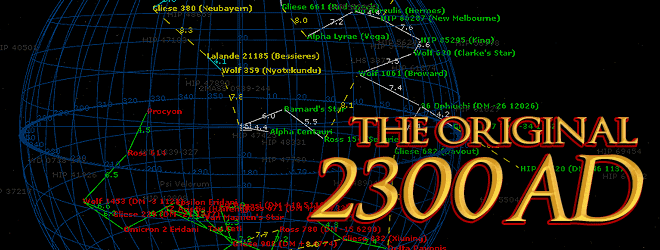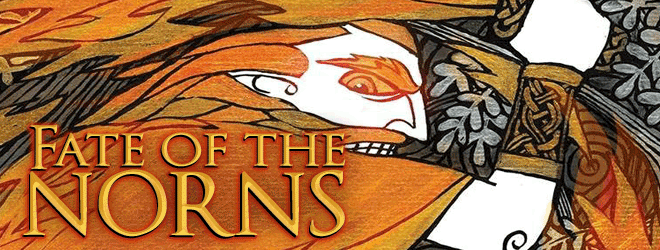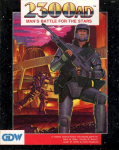 In September 2018 we presented the GDW 2300 AD Bundle. Journey 50 light years from Earth to the uncharted star systems of the frontier; watch your two shadows under a double star; war against the unfathomable Kafers on exotic alien worlds; ride the beanstalk down to the towering cities of Earth, the economic center of an ever-expanding human civilization. Be part of a new age as humanity battles for the stars in GDW’s 2300 AD.
In September 2018 we presented the GDW 2300 AD Bundle. Journey 50 light years from Earth to the uncharted star systems of the frontier; watch your two shadows under a double star; war against the unfathomable Kafers on exotic alien worlds; ride the beanstalk down to the towering cities of Earth, the economic center of an ever-expanding human civilization. Be part of a new age as humanity battles for the stars in GDW’s 2300 AD.
In 1986 Traveller publisher Game Designers’ Workshop debuted a near-future RPG called Traveller: 2300 — a confusing name, because it had nothing to do with Traveller and, in fact, followed on from GDW’s modern-day military RPG Twilight: 2000. The company quickly renamed the line 2300 AD and published a Second Edition two years later.
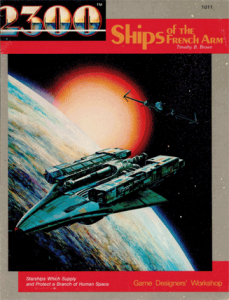 2300 AD starts from Earth 300 years after the cataclysmic Third World War, the Twilight War depicted in Twilight: 2000. Nations still clash, but civilization has crawled back to its pre-war levels and beyond. The world is dominated by the Third French Empire. A space elevator in Gabon lets passengers ride to geostationary orbit. Long ago humanity made first contact with ten sapient alien species, and commerce with aliens is now common. But exploration still goes on. Having discovered a practical faster-than-light “stutterwarp” drive, Earth’s hundred nations are just starting to colonize the stars.
2300 AD starts from Earth 300 years after the cataclysmic Third World War, the Twilight War depicted in Twilight: 2000. Nations still clash, but civilization has crawled back to its pre-war levels and beyond. The world is dominated by the Third French Empire. A space elevator in Gabon lets passengers ride to geostationary orbit. Long ago humanity made first contact with ten sapient alien species, and commerce with aliens is now common. But exploration still goes on. Having discovered a practical faster-than-light “stutterwarp” drive, Earth’s hundred nations are just starting to colonize the stars.
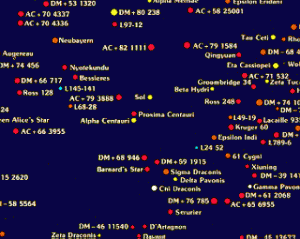 For 2300 AD GDW produced the most accurate star map ever made of the star systems within 50 light years of Earth — over 700 stars, each listed by location, spectral type, size, and magnitude in a separate Near Star List. The local neighborhood contains white dwarfs, red giants, and warm yellow stars like our own. The map also shows the three principal trade routes of human space: the Chinese Arm (Sol to Tau Ceti), currently beset by mysterious terrorists; the French Arm (Sol to Xi Ursae Majoris), where the alien Kafers are invading human space; and the American Arm (Sol to Ellis — a dead end for further expansion, because the next stars lie beyond stutterwarp’s maximum range of 7.7 light years).
For 2300 AD GDW produced the most accurate star map ever made of the star systems within 50 light years of Earth — over 700 stars, each listed by location, spectral type, size, and magnitude in a separate Near Star List. The local neighborhood contains white dwarfs, red giants, and warm yellow stars like our own. The map also shows the three principal trade routes of human space: the Chinese Arm (Sol to Tau Ceti), currently beset by mysterious terrorists; the French Arm (Sol to Xi Ursae Majoris), where the alien Kafers are invading human space; and the American Arm (Sol to Ellis — a dead end for further expansion, because the next stars lie beyond stutterwarp’s maximum range of 7.7 light years).
2300 AD uses a task resolution system different from Classic Traveller and from the Twilight: 2000 system GDW eventually adopted for its other RPGs. Players roll 1D10 against a difficulty number set by the GM; failure calls for a separate 2D6 or 3D6 roll to determine consequences: mishaps, damage, or simply a loss of “determination.” The rules (which convert easily to the GDW house system) cover all aspects of conflict resolution, from arguments to all-out battles, as well as detailed character generation, starship operations and combat, and economics.
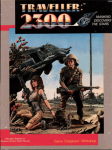 2300 AD has a gritty, grounded feel — less Space Viking, more Aliens. Aside from its FTL drive, the game has unusually low tech for a setting three centuries in the future. To 1980s players everything felt relatively familiar. Still fondly remembered after decades, 2300 AD found new life in 2012 under Mongoose Publishing’s licensed Traveller rules (2008). We presented that version in our June 2014 Mongoose 2300 AD Bundle.
2300 AD has a gritty, grounded feel — less Space Viking, more Aliens. Aside from its FTL drive, the game has unusually low tech for a setting three centuries in the future. To 1980s players everything felt relatively familiar. Still fondly remembered after decades, 2300 AD found new life in 2012 under Mongoose Publishing’s licensed Traveller rules (2008). We presented that version in our June 2014 Mongoose 2300 AD Bundle.
 This all-new collection of the original GDW line included both editions of the core rules — Traveller: 2300 (1986) and 2300 AD (1988) — plus most of the RPG support line for both editions. It’s everything you need for spacefaring adventure out on the edge of human space. There were eight First Edition titles in our Starter Collection (retail value $90) as DRM-free .PDF ebooks, including the Traveller: 2300 1E rules (1986), the Ships of the French Arm guide, the Aurore and Nyotekundu Sourcebooks, and four adventures for First Edition: Beanstalk, Energy Curve, Kafer Dawn, and Mission Arcturus.
This all-new collection of the original GDW line included both editions of the core rules — Traveller: 2300 (1986) and 2300 AD (1988) — plus most of the RPG support line for both editions. It’s everything you need for spacefaring adventure out on the edge of human space. There were eight First Edition titles in our Starter Collection (retail value $90) as DRM-free .PDF ebooks, including the Traveller: 2300 1E rules (1986), the Ships of the French Arm guide, the Aurore and Nyotekundu Sourcebooks, and four adventures for First Edition: Beanstalk, Energy Curve, Kafer Dawn, and Mission Arcturus.
 Those who paid more than the threshold (average) price also got our entire Bonus Collection with eight Second Edition titles worth an additional $90, including the 1988 2300 AD 2E core rulebook; the 2300 AD Equipment Guide and Ground Vehicle Guide; the Colonial Atlas of all the planets in human space; the Kafer Sourcebook, one of the best books in the 2300 line; and three Second Edition adventures: Bayern, Invasion, and Ranger.
Those who paid more than the threshold (average) price also got our entire Bonus Collection with eight Second Edition titles worth an additional $90, including the 1988 2300 AD 2E core rulebook; the 2300 AD Equipment Guide and Ground Vehicle Guide; the Colonial Atlas of all the planets in human space; the Kafer Sourcebook, one of the best books in the 2300 line; and three Second Edition adventures: Bayern, Invasion, and Ranger.
Ten percent of each purchase (after gateway fees) went to the charity designated by Traveller and 2300 AD designer Marc W. Miller, Human Rights Watch.
